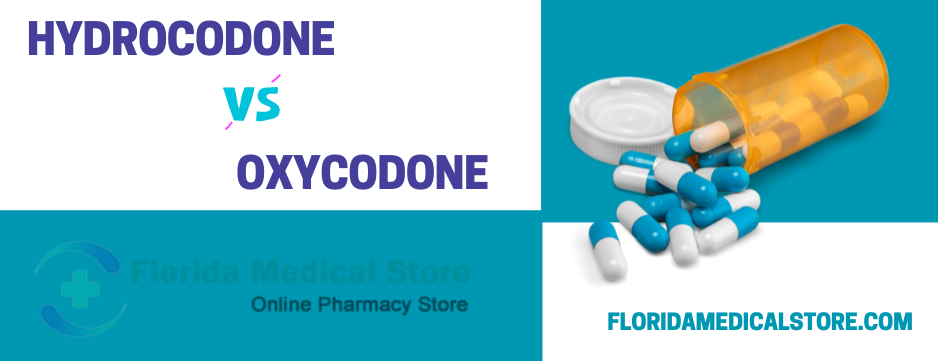
Hydrocodone VS Oxycodone
Opioid painkillers hydrocodone and oxycodone are both potent medications. The primary distinction between the two is that, in drugs like Vicodin, hydrocodone is frequently taken in combination with acetaminophen, whereas oxycodone is usually taken alone. Since oxycodone is generally thought to be stronger than hydrocodone in terms of potency, it might be a better option for treating severe pain.
However, when you buy hydrocodone online or oxycodone if not taken as prescribed by a healthcare professional, both medications have a high risk of addiction and dependence. Therefore, it’s critical to use them sensibly and under medical supervision to prevent any risks or complications. Just remember to always heed your doctor’s advice and never take more than the prescribed amount!
Understanding Hydrocodone and Oxycodone:
Hydrocodone
Strong opioid analgesic hydrocodone provides relief from moderate to severe pain. Although it works well, its potential for addiction and negative side effects make it necessary to use it with caution. Because it is a controlled substance, risks must be reduced by strictly adhering to the recommended dosage and duration. Proceed cautiously and consult medical professionals for advice on how to maximize its advantages and minimize its risks.
Oxycodone
In the field of analgesia, the potent opioid painkiller oxycodone has two sides. On the plus side, it relieves moderate to severe pain quickly, giving those in pain some relief. On the other hand, it carries the dark cloud of addiction and dependency, which puts those who use it at serious risk. Exercise caution when handling it, as its allure can trap the unsuspecting in a vicious cycle of dependency even though it may provide relief.
How They’re Administered:
Both drugs are available in a number of dosage forms, such as liquids, tablets, and extended-release capsules. To increase their efficacy, they can also be taken in combination with other painkillers like ibuprofen, aspirin, or acetaminophen. To prevent issues, it is crucial to carefully adhere to the recommended dosage and administration guidelines when you buy oxycodone online or hydrocodone.
Efficacy and Side Effects:
Efficacy:
Hydrocodone:
- Effective at relieving moderate to severe pain.
- Often prescribed for chronic conditions, post-surgery recovery, and injuries.
- Available in various forms, including extended-release capsules and liquids.
- Typically administered as needed or on a scheduled basis.
Oxycodone:
- Equally effective at alleviating moderate to severe pain.
- Commonly prescribed for acute and chronic pain management.
- Available in extended-release capsules, tablets, and liquid formulations.
- Administered around the clock for sustained pain relief.
Side Effects:
Hydrocodone:
Common side effects may include:
- Nausea and vomiting
- Dizziness
- Constipation
- Dry mouth
- Sweating
- Potential for more frequent constipation compared to Oxycodone.
Oxycodone:
Common side effects may include:
- Drowsiness
- Dizziness
- Headaches
- Nausea and vomiting
- Constipation
- More likely to cause drowsiness and headaches compared to Hydrocodone.
- Risk of respiratory depression and addiction similar to Hydrocodone.
Addiction and Dependency:
The potential for addiction and dependency that comes with opioids like hydrocodone and oxycodone is perhaps the biggest worry. Long-term use or abuse of these drugs can result in physical dependence, where abrupt withdrawal causes withdrawal symptoms, and tolerance, where higher doses are needed to produce the same pain-relieving effects.
Interactions and Risks:
The combination of these two Pain medications with antibiotics, muscle relaxants, and sedatives may have unfavorable effects or lessen their effectiveness. To prevent potentially hazardous interactions, it is imperative that you disclose to your healthcare provider all medications, supplements, and recreational substances you use.
Alternative Treatment Options:
In light of the potential hazards linked to opioids, medical professionals frequently investigate substitute approaches for managing pain. Non-opioid drugs, physical therapy, acupuncture, cognitive-behavioral therapy, and interventional techniques like steroid injections or nerve blocks are a few examples of these. The needs and preferences of each patient should be taken into account when choosing the best course of action.
Choosing the Right Medication:
Both Hydrocodone VS Oxycodone are useful in treating both acute and persistent pain. Both of them have very comparable adverse effects. Since there isn’t much of a difference between these two medications, talking with your healthcare provider will help you decide which one is best for you.
Your medical practitioner can assess the advantages and disadvantages of these two medications based on your medical history. Experts and professionals have discovered that hydrocodone is not as potent as oxycodone. In these situations, your doctor might advise you to start your treatment at the lowest dose feasible to observe how your body responds to the drugs.
You and your healthcare provider can discuss switching up the medications and dosages to see what works best for you if your first option is not totally sufficient, does not work well, or has negative side effects.
Conclusion:
In conclusion, despite being effective pain relievers, hydrocodone and oxycodone have a lot of risks and adverse effects. It is important for patients and healthcare professionals to carefully consider these factors and, whenever feasible, look into alternative treatment options. We can guarantee safe and efficient pain management techniques catered to the requirements of each individual by encouraging open communication and teamwork.

Leave a Reply